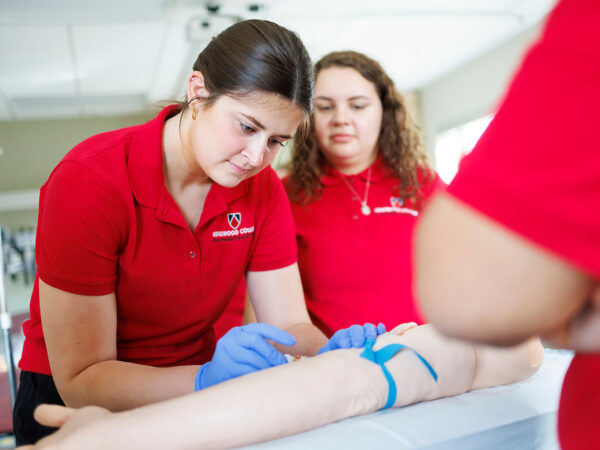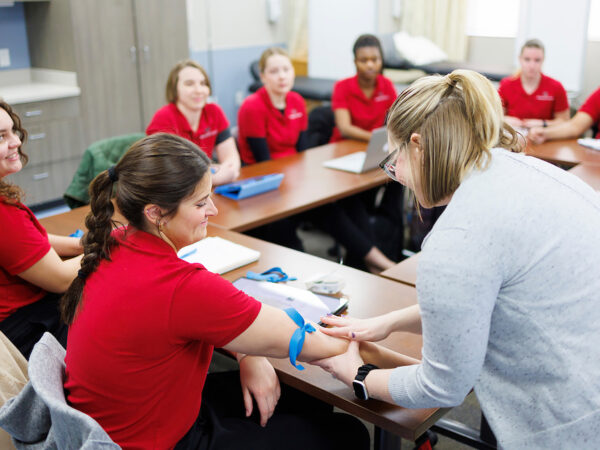Bachelor of ScienceNursingHenry Predolin College of Health Sciences
Be Empowered to Transform Lives
Embark on a career of passion and take a pivotal role at the forefront of healthcare. Becoming a registered nurse is one of the most rewarding careers and will take you on a journey of bringing hope, celebrating the wins, and having a profound impact on the lives of others every day. You will become a trusted professional, advocating for the health and wellbeing of your patients – and their families. Standing in this space is about the profession of patient care, but you can expect to develop a greater sense of purpose in your own life, too.
Choosing the right school is a crucial decision that will significantly impact your education, career, and experience as a nursing student. With our excellent reputation and highly respected faculty, the Edgewood University School of Nursing has a longstanding history of being one of the most respected programs in the state of Wisconsin. Students typically complete approximately 62 credits of general education, elective, and prerequisite coursework prior to beginning the nursing program. While completing all 62 credits by the start of the nursing program is encouraged, students who are a few credits short may still be eligible to apply. Once admitted to the program, students enter the nursing sequence. The School of Nursing comprises four semesters (58 credits) of professional nursing coursework, clinical experiences, and simulation labs. A total of 120 credits is required to graduate with a Bachelor of Science in Nursing.
One of the most dynamic and versatile professions, nursing, offers a wide range of career paths. For students with diverse interests and aspirations, becoming a nurse opens the door to an exciting and fulfilling career. Pursuing a Bachelor of Science in Nursing (BSN) degree at a private, liberal arts school in the thriving, capital city of Madison, comes with advantages:
- Low clinical faculty-to-student ratio.
- Partnerships with reputable healthcare facilities offer diverse clinical opportunities.
- Strong alumni network promotes valuable connections.
- Expand your marketability in a competitive and vibrant healthcare employment market.
Careers in Nursing
5%
Growth rate for registered nurses in the workforce, from 2024 to 2034
As healthcare continues to advance, there is a growing emphasis on the value of highly educated nurses in the workforce. With a BSN, you will be prepared to pass the NCLEX exam and enter the workforce having a competitive edge. Many organizations prefer or require nurses to have a BSN for consideration of certain positions, especially leadership roles. Your bachelor’s degree will also prepare you for entry into graduate programs if your career aspirations include advanced positions such as a nurse anesthetist, nurse educator, nurse practitioner, and nurse manager/administrator.
Be Prepared to Pass Your NCLEX
One benchmark metric of a strong program is their NCLEX-RN exam first-time pass rate. Consistently, our pass rate is significantly higher than the national average. With a 100% NCLEX-RN first-time pass rate, the most recent cohort of students (fall 2024) in this program are an excellent reflection of how the best program is directly tied to positive student outcomes.
Nursing by the Numbers
80+
Community Partners for Clinical Placements
7:1
Student to Clinical Faculty Ratio
Student Spotlight
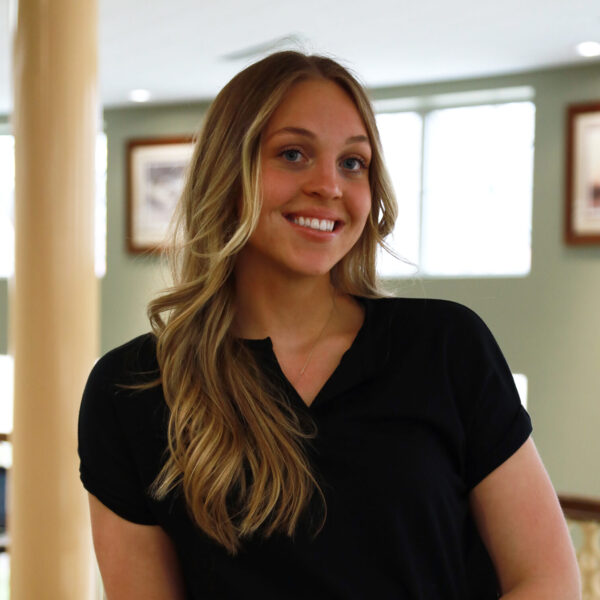
Kallie Norby ’25
Cardio ICU Nurse, UW Health
“Transferring to Edgewood and choosing the nursing program reignited a spark I’d lost after a difficult first year of college. Being in Madison opened the door to incredible clinical experiences, and my professors and preceptors weren’t just teachers – they became mentors who believe in me and connected me to real opportunities. Edgewood gave me more than just a nursing education – it gave me a future I’m proud of.”
Featured Courses
Nursing 305 Nursing Science: Professional Nursing in a Diverse World
Introductory course that examines concepts of client-centered care, family, community, populations, health promotion, global health, social justice, and diversity. Students will examine the transitions of care within and across the environments in which care is provided along with developing an understanding of how health is defined across different cultures and populations. Students will reflect on their personal beliefs and how this may impact their nursing care and describe the relationship between personal health and a culture of health. Dominican values will also be examined as a foundation to professional nursing practice. Students will be expected to engage in wellness activities to promote self-care.
Nursing 320 Nursing Science: Pharmacology & Therapeutics
This course focuses on the major classes of drugs, addressing the physiological and pathophysiological rationale for each drug indication, mechanisms of drug action, dosing implications, and adverse drug events. The course will enhance the student’s comprehension of the scientific complexity of therapeutic interventions and will build upon the foundational sciences. Additionally, the course will provide the student with sufficient scientific knowledge and skills to monitor drugs and therapies in a safe and effective manner. Nurse’s role in assisting individuals and families in the pharmacological management of illness and health maintenance is addressed.
Nursing 401 Nursing Science: Perinatal Nursing
Person and Family Centered Care in Maternal and Infant Health engages students in a family-centered approach to health and health alterations in childbearing women, newborns, and families.
Student Organization
Henry Predolin Student Nurses Association
You will gain valuable leadership experience by joining the Henry Predolin Student Nurses Association (SNA), the largest student association in Wisconsin.
The Henry Predolin SNA regularly sends more delegates to the annual statewide conference than any other school. If you’re interested in gaining incredible global health experience, you might want to consider joining our faculty on a trip to underserved areas like Cambodia, El Salvador, and St. Lucia. It’s an enriching experience to learn and grow while making a positive impact on the world.
Accreditation
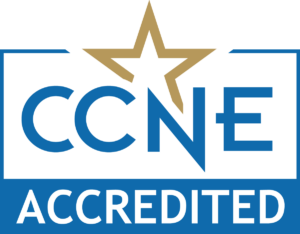
The baccalaureate degree in nursing program at Edgewood University is accredited by the Commission on Collegiate Nursing Education (CCNE), 655 K Street NW, Suite 750, Washington, DC 20001, 202-887-6791. The program is also approved by the State of Wisconsin Board of Nursing.
Application Process
Students will apply for full admission to the Traditional Undergraduate in BS Nursing program the semester before they are eligible to begin nursing coursework.
- You have completed all or nearly all (62) credits of prerequisite coursework or are currently in the semester in which you will complete these credits.
- Maintain at least a 2.75 cumulative GPA in college coursework.
- Maintain at least a 2.75 GPA in prerequisite math and science courses. A minimum grade of “C” is required in all prerequisite math and science courses. NOTE: Required math and science courses must have been taken within (8) years of admission to the first nursing course for credit in the nursing major.
- Complete American Heart Association (AHA) CPR/BLS for Healthcare Providers Certification.
What Should I Know as an Incoming Freshman Student?
For students entering their first year at Edgewood University without an Associate Degree in Nursing (ADN) or previous bachelor’s degree, you will begin by applying to Edgewood University. Additionally, if you are transferring into Edgewood University and have not yet completed the required coursework, you will start by submitting your undergraduate application.
Applications into the School of Nursing are reviewed for students who have completed, or are in progress to complete, the prerequisite coursework including approximately 62 college credits. Most students* will begin applying to the School of Nursing during their 4th semester at Edgewood. It is important to understand that admission into Edgewood University does not imply, or guarantee, admission into the Traditional Undergraduate BS in Nursing Program.
- Submit an Undergraduate Application to Edgewood University and select “Freshman Application” as the type of application.
- Submit High School Transcripts with cumulative GPA and class rank (if available)
NOTE: If high school transcripts are not available, submit GED.
Complete, or be in progress to complete, (62) college credits including prerequisite coursework
Incoming freshman may be eligible for direct admission into the School of Nursing through our Guaranteed Admission Program. Additional details can be found under the Guaranteed Admissions Program section.
Application Process for Current and Transfer Students
The Traditional Undergraduate BS in Nursing Program is split into (62) credits of core and prerequisite coursework and (58) credits of nursing coursework. Once you enter the final semester of your core courses, you can begin the process to apply for the School of Nursing.
Transfer students: If you have completed your prerequisite coursework at another college and anticipate starting the nursing program for your first semester at Edgewood University, you will begin by applying to the School of Nursing. NOTE: You are not required to submit an undergraduate application to Edgewood University.
All current and transfer students are required to apply through the Nursing Centralized Application Services (NursingCAS)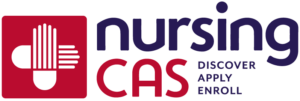
This portal is used to simplify and streamline the application process. Edgewood University’s School of Nursing Admission Committee will review all applicants, and make recommendations to the Dean, who will make all admission decisions. We encourage students to make certain the necessary application qualifications have been met, and to be mindful of the application deadlines.
- Create an account and login to NursingCAS.
- Complete and submit your application including manual entry of all courses including prerequisites. NOTE: Courses entered should match all courses denoted on your official transcripts.
- Upload official transcripts from all colleges you have attended including Edgewood University.
- Pay the required application fee through NursingCAS portal.
- Upload personal statement with 500 word limit. Choose ONE of the following when writing your personal statement:
-
- What does professionalism in Nursing mean to you and how will you apply this in your studies and profession? -OR-
- Nurses uphold responsibilities consistent with providing high quality care. In what ways would you utilize this approach in your practice and address related challenges? -OR-
- What moral and ethical principles would you consider in Nursing? Why is this important?
Transfer students: If you are admitted to the nursing program, you will be required to submit your official high school transcripts directly to the Edgewood University Office of Undergraduate Admissions. Admitted students will receive further instructions when this information is required.
| Entry Term | Application Opens | Priority Deadline | Applications Reviewed & Decisions for Admission Completed |
| Fall | November 15 | February 1 | February 2 – March 1 |
| Spring | August 15 | October 1 | October 2 – November 1 |
Once you have determined that you meet the criteria to apply for the nursing program, you will be ready to start the application process. As this is a highly competitive program and admission is capped at (42) students, we recommend submitting your application and required documentation as soon as the application opens. This allows you ample time to complete each requirement and ensure all required documentation has been received so your application meets the priority deadline. After the priority deadline has passed, applications shift to rolling admission.
The School of Nursing Admissions Committee is comprised of nursing faculty dedicated to screening applicants for admission into this program and making recommendations to the Dean. Admission to the Traditional Undergraduate BS in Nursing program at Edgewood University is highly competitive and is limited to (42) students in the fall semester and (42) students in the spring semester. The School of Nursing Dean will admit the most qualified students based on cumulative GPA, science/math GPA, previous academic records, personal written statement, and credits completed.
Explore Additional Steps to Strengthen Your Nursing School Application
It is common for students to inquire how they can improve the likelihood of securing one of those coveted spots in the nursing program. While the above qualifications take utmost priority in determining program eligibility, the list below offers a guide as to ways decisions are made when we have more highly qualified students than we have open seats.
- Achieve at least a 3.0 GPA or greater (on prerequisite college coursework) to have priority over applicants that meet the minimum GPA of 2.75.
- Complete Certified Nursing Assistant (CNA) requirements and hold a CNA license.
- Degree(s) in other fields.
- Edgewood University Students who have completed (10) or more credits at Edgewood University will have higher priority over those who have less/none.
- Outstanding professional or personal achievements.
- Prior experience working in the healthcare field.
- Proficiency in a second language.
- Strengthen your personal statement.
- Volunteer experience in your community.
Admissions Process
Academic Requirements for Admission
Eligibility for admission to the Traditional Undergraduate BS in Nursing program requires students to complete (62) credits by the program start date and maintain a cumulative GPA of at least 2.75. These (62) credits must include the following prerequisite courses (or their transfer equivalents) listed below:
| COURSE | COURSE TITLE | CREDITS |
| ENG 110 | College Writing | 4 |
| MATH 121 or MATH 114A | Statistics or College Algebra (or higher) | 3 |
| PSY 101 J | General Psychology | 4 |
| PSY 345 | Lifespan Development | 4 |
| CHEM 120 S | General Chemistry I | 4 |
| BIO 155 SU | Human Cell Biology and Genetics | 4 |
| BIO 210 | Anatomy & Physiology I | 4 |
| BIO 211 | Anatomy & Physiology II | 4 |
| BIO 311 | General Microbiology for Nursing | 3 |
| NURS 220 | Therapeutic Principles of Infectious Disease | 1 |
| BIO 412 | Pathophysiology (may be complete first semester of program) | 3 |
Students must also have completed all Edgewood University general education requirements.
For transfer students, BIO 155 SU is not a prerequisite for program admission if Anatomy and Physiology I, Anatomy and Physiology II, and Microbiology have been successfully completed and approved for transfer. Transfer students should contact their Academic Advisor to request a special arrangement waiver if they will not need this course.
Students possessing a baccalaureate degree in another field from a regionally-accredited institution, or a 2-year associates of science or arts degree from Madison College or a UW school are considered to have fulfilled all of Edgewood University’s General Education requirements, except COR courses. Post-baccalaureate students, however, must still meet all School of Nursing pre-requirements for supporting courses in the major.
Eligibility for Guaranteed Admission Program
Incoming freshmen with a strong academic background in high school may be eligible for direct admission into the School of Nursing. Students who agree to participate in the Guaranteed Admission Program for the School of Nursing and meet the following criteria will be granted admission into the major:
- Be admitted to Edgewood University as a new college freshman.
- Achieve at least a 3.5 cumulative high school grade point GPA.
- Maintain at least a 3.25 cumulative GPA in college coursework.
- Maintain at least a 3.25 cumulative prerequisite math and science GPA in all college coursework.
I Have Been Admitted – Now What?
Congratulations on being selected for our esteemed School of Nursing! We look forward to supporting your journey to becoming extraordinary healthcare professionals. Please accept admission within (3) weeks of receiving your Offer of Admission Letter. Nursing students who do not accept admission by the deadline will forfeit their space. Further details will be provided in the School of Nursing Welcome Packet.
Apply for Nursing Scholarships
Visit our scholarships page to view all available Edgewood scholarships.
Go to Edgewood University Scholarships
Or, download a list of external nursing scholarships
Undergraduate Handbook
Nursing Clinical Experiences
The Henry Predolin School of Nursing partners with over 80 community agencies for clinical placements. Locations span across southcentral Wisconsin as well as northern Illinois. Some of these include:
- SSM Health St. Mary’s Hospital – Madison
- The American Family Children’s Hospital
- UnityPoint Health-Meriter Hospitals and Clinics
- UW Hospitals and Clinics
- Veteran’s Administration Hospital
Clinical placements also include multiple public health sites and public/private school sites.
Nursing Faculty Spotlights
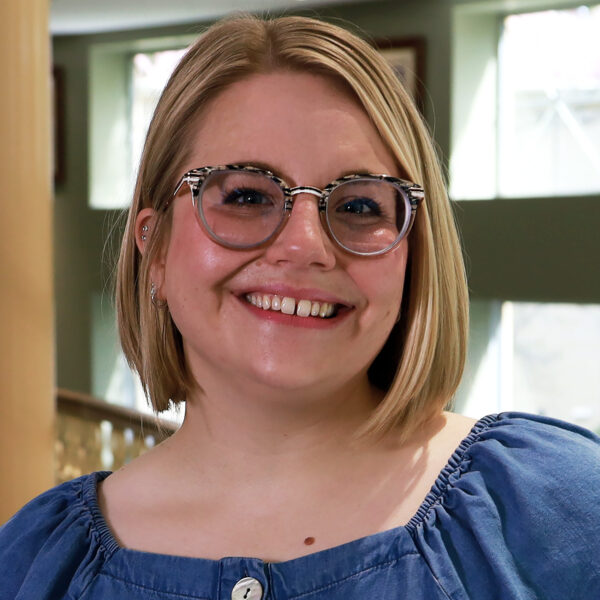
Suzy Karcher, DNP, APRN-CPNP AC
Assistant Professor
SuzKarcher@edgewood.edu
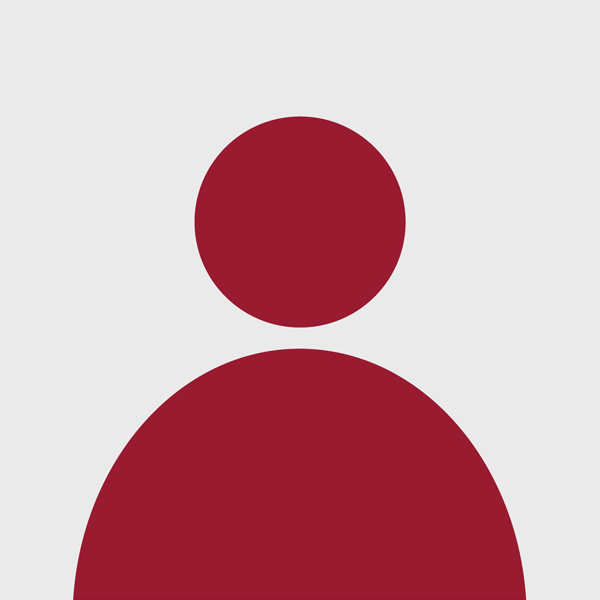
Katie Selle, MA, RN-BC
Senior Lecturer
KSelle@edgewood.edu
Building Confidence Through the Application of Experiential Learning
The Center for Healthcare Education and Simulation (CHES) is a collaborative partnership between Edgewood University School of Nursing, SSM Health St. Mary’s Hospital, and UnityPoint Health – Meriter Hospital. This state-of-the-art space has been providing Edgewood University nursing students with innovative education and training through the utilization of patient simulators. Simulation rooms are designed and equipped to replicate a multitude of environments such as a patient room in a hospital or a clinic, or a resident room of a nursing home, or skilled care facility.
Three realistic patient rooms are fully equipped, each viewable from a control room that allows instructors to monitor students and record sessions. Two of these classrooms are equipped with audio-visual equipment that provides live-feed simulation. This reflective learning environment includes opportunities to discuss and debrief. Robot patient simulators include high-fidelity mannequins across the lifespan – infant, child, birthing mother, adult—that can be programmed to replicate patient conditions and physiologic responses. Several low-fidelity mannequins and task trainers are used by students as they practice specific skills and techniques.
Simulation experiences introduce nursing students to clinical scenarios in preparation for real clinical interactions, thus allowing students to safely practice team-based care and improve individual skills. This learning environment places students in the experience and is often mentioned as a favorite aspect of nursing school. This engaging space fosters team-based learning as students learn, train, and work together. This is where students apply their textbook knowledge, learn from their mistakes, practice skills, and improve communication. It’s also when future nurses emerge and begin to build their self-confidence.
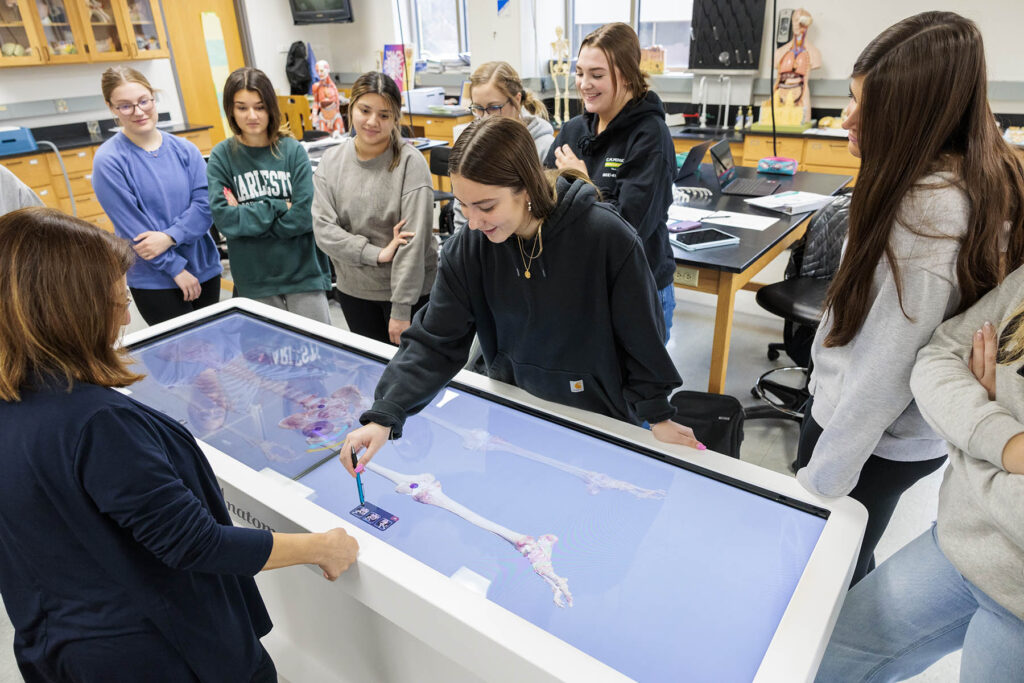
This educational tool provides pre-nursing students with a unique and immersive way to study anatomy while enhancing their understanding of the human body. Students interact with a digital cadaver to learn all levels of anatomy from the whole body to microanatomy and includes 3D investigations of normal and pathological case studies. With this unprecedented level of detail, the advanced technology of the anatomage table allows students to visualize every aspect of the human body and makes it an innovative tool used to teach anatomy and pathology. The interactive and dynamic nature of the tool makes learning anatomy more hands-on, creating an engaging learning experience. An investment into the students’ educational experience, the 3D Anatomage Table serves to bridge theoretical knowledge with practical application, ultimately improving the overall educational outcomes and clinical preparedness of graduates of our nursing program.
What are the differences between and ADN and a BSN?
Nurses with a bachelor’s degree in nursing (BSN) and passing NCLEX-RN score are hired as a Registered Nurse (RN). Nurses with an associate’s degree in nursing (ADN) and passing NCLEX-RN score are also hired as RNs. While an ADN requires less education, many organizations require their nurses to hold a bachelor’s degree. Bachelor’s degree programs offer nursing students a more advanced and comprehensive education which will enhance career opportunities, increase earning potential, and position future RNs as leaders in their field.
What if I already have an ADN?
Edgewood University has an innovation option available for students who have achieved their ADN. We offer an ADN-MSN which allows students with an ADN to complete their BSN in as few as 21 months while integrating 12 credits of MSN coursework into the curriculum. Upon completion of the BSN, students have the option to continue pursuing a master’s degree in nursing with as few as 18 additional credits.
What if I have a baccalaureate degree in another field?
Students in this situation have two options to pursue their Bachelor of Science in Nursing degree (both options require that students have to meet prerequisites):
Option 1: Apply to the Traditional BSN program
Option 2: Apply to the Accelerated BSN program (one-year pathway to BSN). Edgewood University has an on-campus ABSN program and an online ABSN program.
While not a prerequisite for admission, certification is required for students in the program. We strongly encourage students to be certified at the start of the program to avoid the need to renew in the middle of the program (certification lasts two years). CPR/BLS for Healthcare Providers must be complete through the American Heart Association (AHA). No other courses will be accepted.
Does Edgewood University have a partnership for students at UW-Whitewater Rock County?
Edgewood University + UW-Whitewater at Rock County
A Seamless Pathway from Associate Degree to Bachelor of Science in Nursing
This unique partnership brings Edgewood University’s nursing program directly to Rock County. Students benefit from a fully staffed faculty, expert clinical coordination, and a curriculum that combines in-person classroom learning with hands-on clinical and simulation experiences.
How it works:
- Begin by earning your Associate of Arts and Sciences with a pre-nursing emphasis at UW-Whitewater at Rock County.
- Upon completion, you’ll receive priority admission consideration to the Edgewood University School of Nursing – right on the Rock County campus.
- Simulation labs are held in our state-of-the-art Simulation Center at the Rock County campus, with clinical placements across Rock County and neighboring communities.
This program proudly welcomed its first cohort in Fall 2023.
Want to Learn More?
For more information on any of these nursing partnership programs, please contact:
Amy Brinks
Program Specialist/Outreach Coordinator
abrinks@edgewood.edu
Does Edgewood University have a partnership for students at Beloit College?
Edgewood University + Beloit College
Earn Two Bachelor’s Degrees in Four Years
This innovative dual-degree program allows students to earn a Bachelor of Arts or Science from Beloit College in three years and a Bachelor of Science in Nursing through a 12-month accelerated program offered by Edgewood University – right on Beloit’s campus
How it works:
- Complete your 3-year bachelor’s degree at Beloit College
- Begin the 12-month BSN program in May of your fourth year
Our first cohort has already begun this exciting journey, with nursing studies beginning in May 2025.
Want to Learn More?
For more information on any of these nursing partnership programs, please contact:
Amy Brinks
Program Specialist/Outreach Coordinator
abrinks@edgewood.edu
